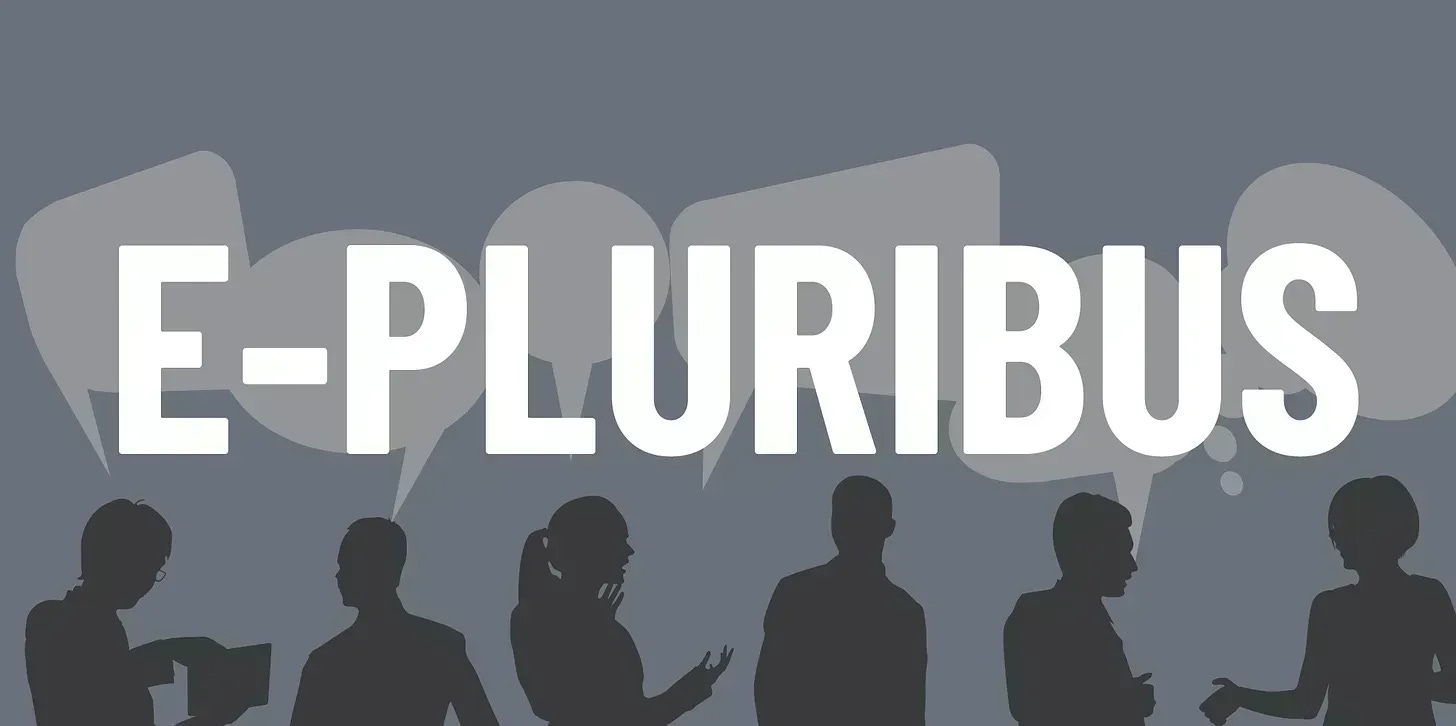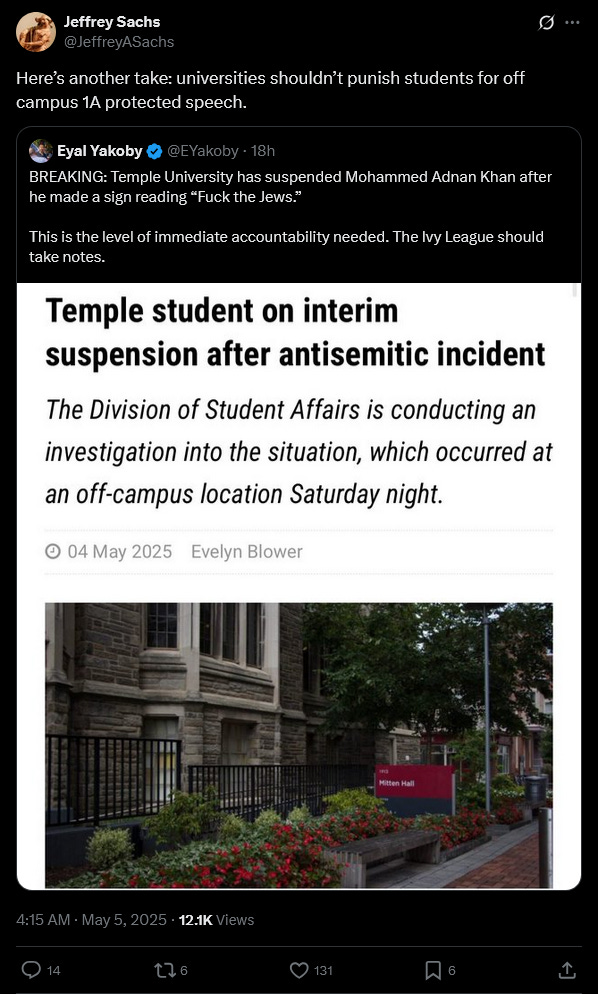E-Pluribus | May 5, 2025
IRS claims Americans don't own their data. Censor free speech to restore it? How universities restrict faculty freedom
A round-up of the latest and best musings on the rise of illiberalism in the public discourse:
Brent Skorup, Laura Bondank: The IRS Says Your Digital Life Is Not Your Property
You don’t own your digital data and government agencies can access it without a warrant—or even without telling you they accessed it—if they deem it necessary. Such a claim seems like an obvious affront to the First Amendment, and yet that’s the IRS’ argument to the Supreme Court in Harper v. O'Donnell, a case with monumental implications for online privacy. Brent Skorup and Laura Bondank explain why at Reason:
When the IRS secretly demands your financial records and private information from a third party, without a warrant, what rights do you still have?
That's the question at the heart of Harper v. O'Donnell, which is before the Supreme Court. New Hampshire resident Jim Harper is fighting back against the IRS after discovering he was swept up in a massive digital dragnet. The case could redefine how the Fourth Amendment applies in the age of cloud storage—and it may determine whether your emails, location history, search queries, and financial records that tech companies store on your behalf are treated as your property.
In 2016, the IRS ordered the cryptocurrency exchange Coinbase to hand over transaction records of over 14,000 customers. Harper was among them and only learned of the government's records grab after the IRS sent him a warning letter, mistakenly suggesting he'd underreported his cryptocurrency income. He soon discovered the IRS had his transaction logs, wallet addresses, and public keys—allowing the agency to monitor any future transactions he made.
Harper hadn't done anything wrong. He'd simply used a legal platform to buy and sell cryptocurrency. But his digital footprint became visible to the government overnight.
Now he's suing the IRS not just to protect his own privacy, but to force the agency to delete the records it obtained and to establish a broader legal principle: that digital records stored on third-party platforms can be the property of the user who created them. Harper argues that Coinbase's own terms of service make clear that the data belong to him, not the platform, and therefore, the IRS should have been required to get a warrant before accessing the information. The federal government, including the IRS, and local police argue that recognizing ownership would impede surveillance and law enforcement.
Lower courts dismissed Harper's arguments, citing the "third-party doctrine"—a legal doctrine from the 1970s that says Americans lose their Fourth Amendment protections if they share information or records with businesses.
Today, when nearly every aspect of our lives is stored and synced through digital intermediaries, the doctrine has become a gaping loophole for mass surveillance. Financial regulators, in particular, are eager to exploit this loophole to vacuum up Americans' financial records without a warrant.
Daniel Hall: Trump’s Aggressive Actions Against Free Speech Speak a Lot Louder Than His Words Defending It
At Counterpunch, Constitutional Law professor Daniel Hall argues that the federal government is paying lip service to the value of free speech while undermining it at every turn. In effect, he concludes, the new administration is perversely censoring speech while claiming to protect it:
Free speech is fundamental to human progress. Scientific, medical, technological and social advancements all rely on the free flow of information. Robust discussion and disagreement are equally important to maintaining a healthy constitutional republic.
In the words of the late U.S. Supreme Court Justice Robert Jackson, “If there is any fixed star in our constitutional constellation, it is that no official, high or petty, can prescribe what shall be orthodox in politics, nationalism, religion, or other matters of opinion or force citizens to confess by word or act their faith therein.”
The First Amendment’s free speech and press clauses protect all forms of expression – oral, print, digital and artistic – from governmental interference or punishment.
Of the many types of speech, political speech is the most protected.
On the first day of his second term in office, Trump issued another free speech executive order. It affirms the administration’s commitment to free speech, directs that tax money is not used to abridge free speech and instructs federal employees to “identify and take appropriate action to correct past misconduct by the Federal Government related to censorship of protected speech.”
In a vacuum, Trump’s orders appear to bode well for free speech.
But what is important is free speech reality, not rhetoric. Three months into his second term, where does Trump stand?
The many interconnected orders, letters, statements and actions of Trump’s White House make an assessment of any positive effects difficult. On the other hand, the Trump administration has clearly violated and chilled free speech on many occasions.
John D. Sailer: How universities restrict faculty freedom
The government’s ongoing effort to enforce its preferred speech regulations on college campuses has taken attention off another troubling censorship campaign: school administrations threatening department funding cuts to influence faculty hiring decisions. John D. Sailer deconstructs the scheme for City Journal:
Throughout my recent City Journal series, I’ve shown how dozens of American universities have developed special fellow-to-faculty hiring programs. Universities use these initiatives to recruit postdoctoral fellows—often with extra administrative involvement in the selection process and a heavy emphasis on diversity—and favor those fellows for tenure-track jobs. It’s a favorite tool of the Mellon Foundation, and it helps administrators strong-arm departments into hiring their preferred candidates.
That threatens faculty self-governance. Multiple professors told me how deans denied or limited their departments’ funds for regular hiring, while strongly encouraging them to hire through fellow-to-faculty programs. In effect, these initiatives allow administrators to use budgetary carrots and sticks to reshape faculty hiring, normally the domain of academic departments.
In December, University of Michigan physics professor Keith Riles denounced the school’s two fellow-to-faculty programs at a board of regents meeting. He described the programs as “manifestly discriminatory” and thus in violation of Michigan’s state constitution, which prohibits racial preferences.
When we spoke, Riles added that clever administrative maneuvering gives these programs their teeth. “Even when an ordinary hiring request is denied, there remains another path”—that is, the fellow-to-faculty programs—“which is somehow magically unbound by the usual budgetary constraints,” he said. “The message is, ‘We’re sorry, there isn’t enough money in the regular pot, but don’t forget about that other pot, if you can find an academically strong candidate who checks the right boxes and passes a highly political litmus test.’”
…
These bullying tactics violate many professors’ understanding of academic freedom. As Princeton professor Gregory Conti has written in City Journal, the “structure of American academic freedom conjoins theories of individual rights and self-government.” On this view, academic freedom involves both the freedom to research and teach according to one’s conscience and scholars’ collective freedom to run their own professional affairs without top-down interference.
Around X
Some political commentators are celebrating universities that censor offensive speech from their students. Jeffrey Sachs has a different perspective:
The federal government may claim it’s just protecting domestic filmmakers with a tariff on foreign movies; the Foundation for Individual Rights and Expression (FIRE) argues it’s actually censoring creators with a flimsy economic justification:
Most First Amendment advocates will credit Elon Musk for stemming the tide of censorship in the US. Robert F. Kennedy, Jr. went even further last week: free speech wouldn’t exist without Musk at the helm of X:








